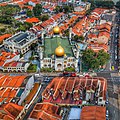Sultan Mosque
| مسجد سلطان Sultan Mosque | |
|---|---|
Masjid Sultan | |
 | |
| Religion | |
| Affiliation | Islam |
| Branch/tradition | Sunni Islam |
| Location | |
| Location | 3 Muscat Street Singapore 198833 |
 Location in Singapore | |
| Geographic coordinates | 1°18′08″N 103°51′32″E / 1.3022°N 103.8590°ECoordinates: 1°18′08″N 103°51′32″E / 1.3022°N 103.8590°E |
| Architecture | |
| Architect(s) | Denis Santry |
| Type | Mosque |
| Style | Indo-Saracenic style |
| Date established | 1924 |
| Groundbreaking | 1924 |
| Completed | 1932 |
| Construction cost | S$200,000 |
| Capacity | 5,000 |
| Designated as NHL | |
| Designated | 8 March 1975 |
| Website | |
| sultanmosque | |
Sultan Mosque or Masjid Sultan is a mosque located at Muscat Street and North Bridge Road within the Kampong Glam precinct of the district of Rochor in Singapore. It was named after Sultan Hussain Shah. In 1975, it was designated a national monument.[1]
History[]
When Singapore was ceded to the British in 1819, Temenggong Abdul Rahman, the Temenggong of Johor, and Sultan Hussain Shah of Johor, under whose jurisdiction Singapore fell, acquired small fortunes in exchange for their power. Sir Stamford Raffles also granted the Temenggong and the Sultan an annual stipend and the use of Kampong Glam for their residence.
The area around Kampong Glam was also allocated for Malays and other Muslims. Hussain built a palace there and brought his family and a complete entourage from the Riau islands. Many of the Sultan's and Temenggong's followers came to Kampong Glam from the Riau Islands, Malacca and Sumatra.
Sultan Hussain then decided to build a mosque befitting his status. He constructed a mosque next to his palace from 1824 to 1826 with funds solicited from the East India Company. With a two-tiered pyramidal roof, it was of a typical design. The original building was replaced with a new mosque.
The management of the mosque was headed by Alauddin Shah, the Sultan's grandson, until 1879, when he passed the torch into five community leaders. In 1914, the lease was extended by the government for a further 999 years and a new board of trustees was appointed, with two representatives from each faction of the Muslim community.
By the early 1900s, Islamic commerce, culture and art had grown in Singapore. Sultan Mosque soon became too small for this burgeoning community. In 1924, the year of the mosque's centenary, the trustees approved a plan to erect a new mosque. The old mosque had by then also fallen into a state of disrepair.
Architecture[]
Architect Denis Santry of Swan & Maclaren adopted a Saracenic style, incorporating minarets and balustrades. The mosque was completed after four years in 1928.
Opening[]
The mosque was two-thirds complete and was formally opened on 27 December 1929.[2] The mosque was fully completed in 1932.[3]
The Sultan Mosque has stayed essentially unchanged since it was built, with only repairs carried out to the main hall in 1968 and an annex added in 1993. It was gazetted as a national monument on 8 March 1975.
The mosque is currently managed by its own Board of Trustees and Management Board.
Transportation[]
The mosque is accessible from Bugis MRT station.
See also[]
Gallery[]
Masjid Sultan Sign
Masjid Sultan at Muscat Street in Kampong Glam

Masjid Sultan Aerial Perspective. The urban encroachment into the heritage protected precinct of Kampong Glam - home of Singapore's precolonial indigenous artisocracy is visible from this aerial panorama taken in February 2008

Aerial perspective of Masjid Sultan in Singapore
References[]
- ^ "Sultan Mosque". Roots. Retrieved 26 September 2018.
- ^ "New Sultan Mosque at Kampong Glam". Retrieved 2018-09-24.
- ^ "Matters of Muslim Interest". Retrieved 2018-09-24.
- National Heritage Board (2002), Singapore's 100 Historic Places, Archipelago Press, ISBN 981-4068-23-3
External links[]
| Wikimedia Commons has media related to Masjid Sultan. |
- Mosques in Singapore
- Tourist attractions in Singapore
- National monuments of Singapore
- Mosques completed in 1928
- Rochor







